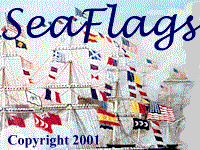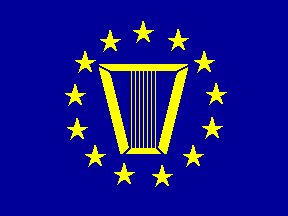
 |
Navy DepartmentFlags of Senior Civilian and Military Officials |
On this page:
Except for the
anchor's having been enlarged and redesigned over the years, this basic
design was adopted as the flag for the Secretary of the Navy in 1866.
When displayed on a staff for indoor or parade use, it is trimmed with
golden yellow fringe and equipped with a golden yellow cord and tassels.
The flagstaff ornament for the Secretary of the Navy's flag is a brass
spread eagle.
The position
of Under Secretary of the Navy was created in 1940, superseding that of
Assistant Secretary as the number two post in the Department. A flag
for the position was established on June 16, 1943. It has the same
design as the Secretary's but on a red field, following the long-standing
but since abandoned practice by which the second senior flag officer of
a given rank flew a red flag with white stars while the seniormost flew
blue with white stars. James V. Forrestal was the first occupant
of this office and the first to fly its flag; he was subsequently to hoist
the blue flag of Secretary of the Navy (1944-47) and the first to hoist
that of the Secretary of Defense (1947). The Under Secretary's flagstaff in boats
or for indoor and ceremonial use is topped by a halberd.
The Assistant
Secretary of the Navy's flag was created in 1892 and authorized for display
aboard ship in the 1900 edition of Navy Regulations. The design
chosen was the same as that of the Secretary's flag but with the colors
reversed. This has since become the standard system in the U.S. Government
for differencing the flags of the first and second ranking civilian officials
in any hierarchy. At the time the flag was created, the assistant
secretary was the second-ranking official in the Navy Department.
There are now four assistant secretaries of the Navy who rank after the
Under Secretary. When displayed in the bow of a boat or for indoor
or parade use, the staff is topped with a halberd.
The Chief of Naval
Operations is by law the senior officer of the naval service, except for
an officer assigned as Chairman or Vice Chairman of
the Joint Chiefs of Staff. Since
the post of CNO was created in 1915, all its incumbents have been full
admirals. Although the Navy was the first service to use personal
flags for senior officers, the Army, Air Force, and Marine Corps all preceded
it in adopting a flag specifically for the Service chief. The CNO's
flag was approved in October 1964. The design
follows the basic pattern originally established by the flag for the Chief
of Staff of the Army, with the field divided diagonally, but in the Navy's
case the stars are arranged in the traditional diamond pattern of a four-star
admiral rather than in the horizontal row used by the Army and Air Force.
The device in the center is the seal of the Office of the Chief of Naval
Operations surrounded by a golden chain of 50 links, one for each state.
In boats and for indoor and parade use, the CNO's flagstaff is topped by
a spread eagle finial.
Like the Chief of Naval Operations, the Vice Chief is also a four-star
admiral. The flag is similar to that of the CNO, but with two diagonal
lines dividing the field into four sections. The VCNO's flagstaff
ornament is a
halberd.
 Civilian officials of flag-equivalent rank below the level of assistant secretary
are generally appointed to the Senior Executive Service and are entitled to display the SES flag in their offices and to
use it on letterhead and other personal items just as flag officers do. This flag is not hoisted on fixed flagpoles or aboard ship.
The flag, which is approved by the Office of Personnel Management and used by SES members throughout the government
(except in a few agencies that have prescribed flags of somewhat different design)
shows the Senior Executive Service "keystone" emblem surrounded by 13 stars. The flag is trimmed with golden-yellow fringe.
Civilian officials of flag-equivalent rank below the level of assistant secretary
are generally appointed to the Senior Executive Service and are entitled to display the SES flag in their offices and to
use it on letterhead and other personal items just as flag officers do. This flag is not hoisted on fixed flagpoles or aboard ship.
The flag, which is approved by the Office of Personnel Management and used by SES members throughout the government
(except in a few agencies that have prescribed flags of somewhat different design)
shows the Senior Executive Service "keystone" emblem surrounded by 13 stars. The flag is trimmed with golden-yellow fringe.
Sea
Flags
Copyright 2000, 2001 by Joseph McMillan